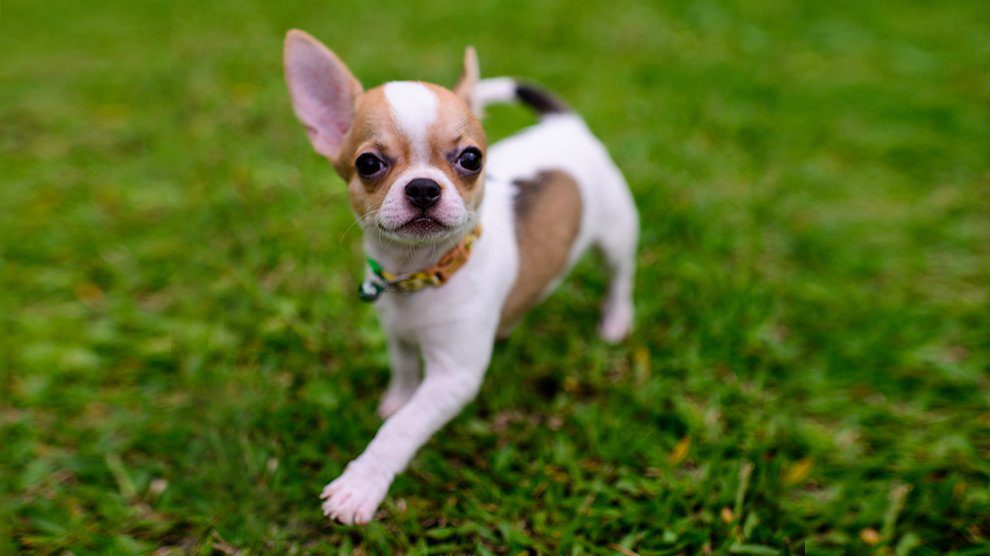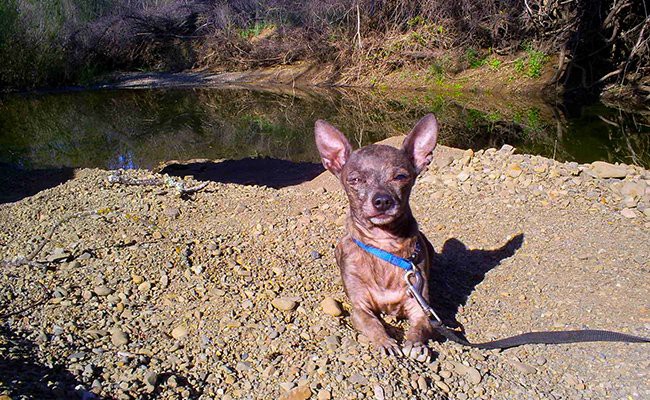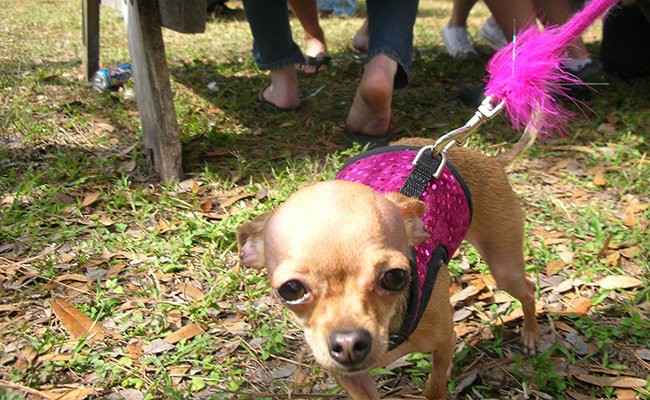- Teacup Chihuahua Breed Characteristics
- Teacup Chihuahua Size & Weight
- Temperament Of A Teacup Chihuahua
- Teacup Chihuahua Lifespan
- Teacup Chihuahua Health Problems
- How To Train A Chihuahua?
- Feeding Teacup Chihuahua
- Interesting Facts about Teacup Chihuahua
- Teacup Chihuahua Breeder
- Teacup Chihuahua Price
Dog Pregnancy Calculator And Timeline
Teacup Chihuahua or Toy Chihuahua is the miniature version of the original dog. It received its name Chihuahua from the fact that it was first discovered in Chihuahua, a Mexican state.
They were referred to as ‘Teacup’ owing to their size like many other teacup puppies like Teacup Pug, Teacup Maltese, Teacup Pom, Teacup Yorkie, etc.; they are so small that they would even fit into a tiny cup. Many get confused when they come across this term mistaking it to be the name of a breed; well, the term has nothing to do with the breed but just implies the size of the dog.
This breed is absolutely apt for adults living in apartment and condos; that doesn’t indicate that it should not be given to children at all but it should have adult supervision all the time.
Due to their fragile body build up, they get easily injured and might sometimes turn aggressive when threatened or hurt.
Teacup Chihuahua Breed Characteristics
- Origin: Mexico
- Size: Very Small
- Dog Breed Group: Toy Group
- Purebred: Yes, but “Teacup” is not officially recognized as a separate breed; it’s a smaller version
- of the standard Chihuahua
- Lifespan: 12-16 Years
- Height: Less than 6 inches (15 cm) typically
- Weight: Under 5 pounds (2.3 kg)
- Coat Appearance: Can be either smooth or long-coated
- Coat Colors: Comes in a variety of colors including black, white, fawn, chocolate, cream, and silver
- Temperament: Alert, lively, confident, often thinks it’s bigger than it is
- Good With Children: Better with older children who know how to handle small dogs gently
- Intelligence Level: High
- Good With Pets: Can be good with other pets, but sometimes jealous or competitive
- Hypoallergenic: No
- Grooming: Low for smooth coat, moderate for long coat; requires regular grooming
- Barking: High; tends to bark more than many other breeds
- Suitable For Apartments: Yes, ideal for apartment living due to small size
- Need For Exercise: Moderate; requires regular, light exercise
- Easy To Train: Can be stubborn; requires consistent, patient training
- Good For First Time Owners: Yes, but best for those who understand how to care for very small dogs
- Health Issues: Prone to health problems due to small size, including hypoglycemia, dental issues, heart problems, fragile bones
- Litter Size: Typically 1-3 puppies
- Average Price: $500 to $2,000 USD
Teacup Chihuahua Size & Weight
To take better care of your pet; you need to acquaint yourself with the common features associated with the Teacup Chihuahua.
The size of a Chihuahua is quite debatable because there is no such standard height allotted to the little one.
Size – Few dogs grow up to 6 -9 inches while few falls in a range of 12 to 15 inches.
Weight – Most of the Chihuahuas have a standard weight of 6lbs.
Sometimes customers buy a Chihuahua only after they confirm if the weight is below or equal to 4-5lbs.
Temperament Of A Teacup Chihuahua
Chihuahuas can be great family companions; they love cuddling and being pampered by their owners.
Their behavior very much depends on their genetic temperament so if its parents were anti-social then there are chances that the pup turns out to have the same hostile nature.
The follows features are quite common in all Teacup Chihuahua;
- Entertaining – These loyal little dogs can sometimes be very playful and comical; you won’t feel bored even for a second when the pet is around.
- Suspicious towards strangers – This nature is very common among all dogs but Chihuahuas, in particular, cannot stand the presence of a new member and needs time to get acquainted.
- Love Warm Sunny Climate – They do not need someone’s help to exercise regularly; let them out in the sun and watch them do their own bit of jumping and running around
Teacup Chihuahua Lifespan
They have an average life expectancy of 15 to 20 years, if well taken care of. The weight and genes of a Teacup Chihuahua are also important factors contributing to its lifespan.
If you give your pet the required diet, regular vaccinations, proper oral care, and enough exercise, then your Chihuahua could live up to 22 years of age.
Teacup Chihuahua Health Problems
These are the potential health issues that the Chihuahua breeds are prone to suffer from
Hydrocephalus – This disease makes the pet lethargic all the time and the most significant symptom includes the abnormally large head with slow body growth; they usually look smaller than their siblings.
Collapsed Trachea – Improper formation of cartilaginous rings in the tracheas lead to this condition. It is quite common in smaller breed dogs and is mostly congenital.
Molera – This is a soft spot mostly found in the skull of an apple-head teacup Chihuahua. This is not a defect and gradually closes with age, but a small head injury at this time can have adverse effects. Hence, make sure to care for your pet completely in the early stages.
Obesity – Teacup Chihuahua can easily become obese if the diet is not kept under control. Prolonged obesity can also lead to heart problems resulting in the shortened lifespan.
Eye Problems – Chihuahuas with protruding eyes suffer from eye infections due to certain air-borne allergens. You must visit a vet if you see your pet having the continuous flow of tears from the eyes.
Keeping the health of the pet in check can be easily achieved by following simple prevention methods and proper vaccination.
Take your pet to a good vet once in a while for a complete checkup.
How To Train A Chihuahua?
Chihuahuas are hard to train and even getting them to practice the basic might seem impossible, but consistent training can help obtain positive results.
Cuddling your pet is fine but not letting it play by himself is, in a way, restricting your pet from living a normal fun-filled life. Teacup Chihuahua needs sufficient exercise and open air to remain active.
- Train them when they are young – It would be difficult to teach them to perform a specific task when they grow older. So get them to train regularly from the early days; when they are still young.
- Help them Socialize – They are quite picky and do not socialize much if not taught. They bark at everyone and even dogs that are bigger than them.
Few owners have reported their pets to have bitten other animals. It is necessary that you take your pet outdoors and get him to make friends with people and other pets. - Be Firm but Gentle – Chihuahuas are the noisiest of all dog breeds and bark their lungs out if not ordered to stop. You need to train them to stop barking at your command; this can seem tiring at first but your pet will gradually learn if you are consistent in your efforts.
- Teach him to behave when ‘Home Alone’ – Chihuahuas can extremely turn aggressive when left alone at home without care. Train them to overcome separation anxiety; this must be done when the dog is young.
Feeding Teacup Chihuahua
Breeders usually have their own special food brand so when you buy a new Teacup Chihuahua, it is better if you buy a pack from the breeder.
Always mix the old and new food (the one that you prefer to feed your pet with) in the early days; this way the pet will gradually get accustomed to the food you provide.
Here’s a guide to food habits based on the age of the pet;
First few months – You should leave the pup free to nibble away the food whenever he wants. So make sure the food is left free to access.
Starting from 3 Months – Split the food portions to 3-4 times a day. Do not overfeed them during these months or even after; Chihuahua can easily grow obese.
From 6 Months – You can give them larger portions than usual and you can bring the food intervals down to 2-3 times a day.
From 1 Year – You can allow your pet to have a feast; feeding them 2 times a day would be ideal after this age.
You can give them a light snack in between training sessions or in the evenings. Ensure that the food you give him is of extremely good quality because the quality of its food affects a Chihuahua’s daily activeness.
Interesting Facts about Teacup Chihuahua
It is the world’s smallest breed. You might be aware of this fact by now!
Teacup Chihuahuas have a temper and may turn angry and violent if abused or threatened.
Teacup Chihuahuas were consumed as food by the Aztecs. This fact would make anyone feel sick but it is a proven fact that these lovely pets were sold as a source of food.
They suffer a lot from separation anxiety. If not trained properly, Chihuahuas can turn your house into a battlefield. Lol! They might turn anxious and start chewing up whatever they find around.
They easily fall sick; Chihuahuas are prone to health issues and get diseases quite often when compared to the other dog breeds.
Teacup Chihuahua Breeder
Before you go out buying a Teacup Chihuahua, make sure you get it from a reliable source. There are only a few legit registered breeders, so you need to do your homework before connecting with a trustworthy source.
Many breeders might fool you into buying Chihuahuas that were an outcome of unhealthy parents; stay alert and get the breeder to sign up guarantee papers if possible.
Here are a few tips to identify a good breeder;
- An authentic breeder would feed his puppies with premium quality food.
- Willingly educate you about the breed in detail.
- Allow you to take a look at the pet before you buy it.
- Participate only in AKC sanctioned Dog shows.
Teacup Chihuahua Price
At present a Teacup Chihuahua could cost you anywhere between $500 and $1200. But some breeders might demand even $2000 based on how smooth the coat is, how healthy the breed is, etc.
If a breeder asks you to buy the pet claiming it to be extra-small and special; they do not go by his flattery words; the size of a Chihuahua shouldn’t be given as a reason for its high price.
If you are planning to take in a foster pet, know all the information including the pros and cons of doing so.
Once you have a pet in your house, you need to put your mind and heart taking care of its needs and providing it with a suitable environment to feel at home. Happy Fostering To You!





















